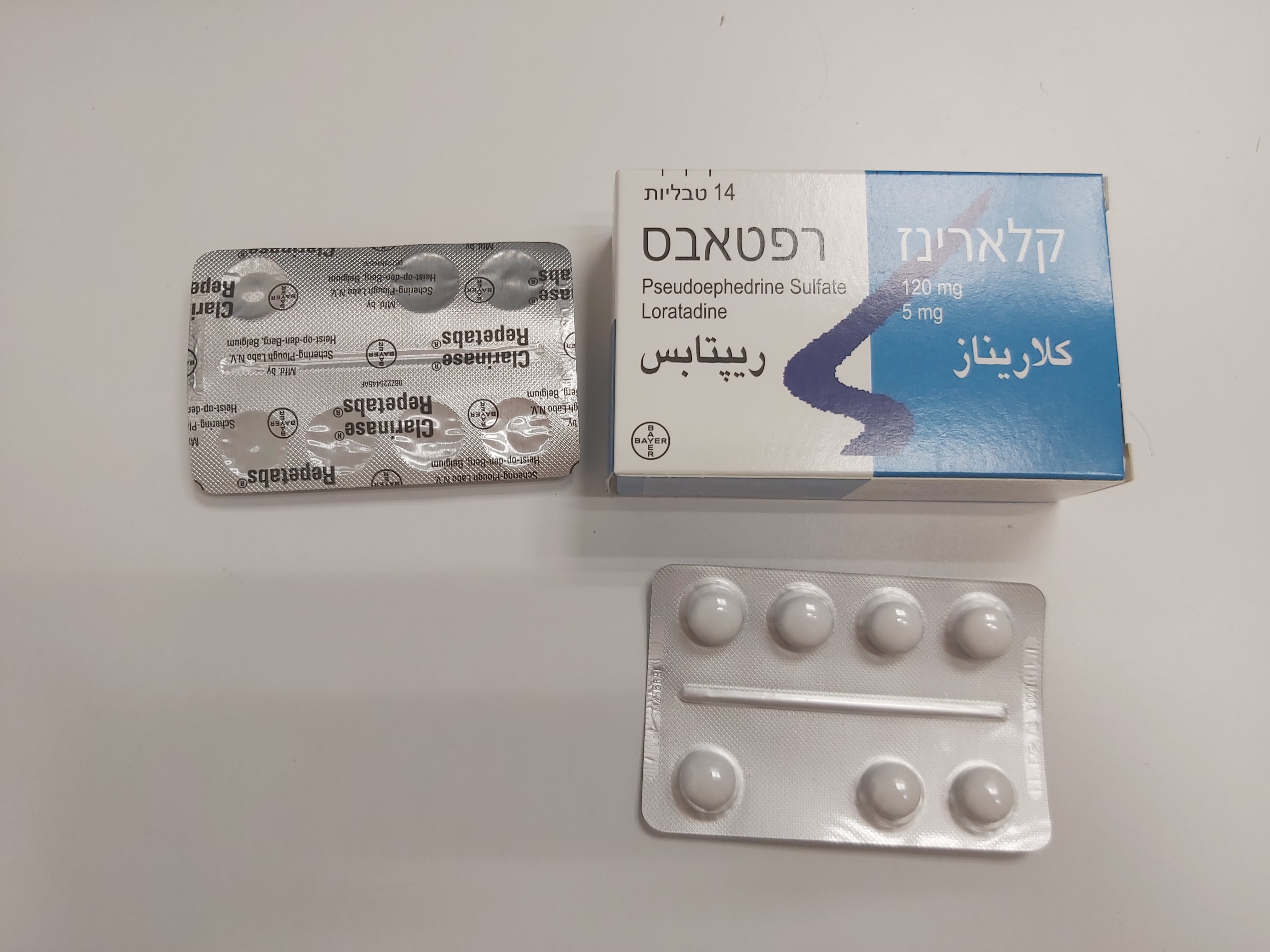Quest for the right Drug

קלארינז רפטאבס CLARINASE REPETABS (LORATADINE, PSEUDOEPHEDRINE SULFATE)
תרופה במרשם
תרופה בסל
נרקוטיקה
ציטוטוקסיקה
צורת מתן:
פומי : PER OS
צורת מינון:
טבליות בשחרור ממושך : TABLETS PROLONGED RELEASE
עלון לרופא
מינוניםPosology התוויות
Indications תופעות לוואי
Adverse reactions התוויות נגד
Contraindications אינטראקציות
Interactions מינון יתר
Overdose הריון/הנקה
Pregnancy & Lactation אוכלוסיות מיוחדות
Special populations תכונות פרמקולוגיות
Pharmacological properties מידע רוקחי
Pharmaceutical particulars אזהרת שימוש
Special Warning עלון לרופא
Physicians Leaflet
Special Warning : אזהרת שימוש
4.4 Special warnings and precautions for use Do not exceed the recommended dosage and the duration of treatment (see section 4.2). Patients of 60 years or older are more likely to experience adverse reactions to sympathomimetic medications. The safety and efficacy of the combination have not been established in this population, and there are insufficient data to give adequate dose recommendations. The combination product should not be used in patients above 60 years of age. Renal or hepatic impairment: The safety and efficacy of the combination have not been established in patients with impaired renal or hepatic function, and there are insufficient data to give adequate dose recommendations. The combination product should not be used in patients with impaired renal function, renal tubular acidosis or impaired hepatic function. Patients should be informed that the treatment should be discontinued in case of hypertension, tachycardia, palpitations or cardiac arrhythmias, nausea or any other neurologic sign (such as headache or increased headache). Central nervous system stimulation with convulsions or cardiovascular collapse with accompanying hypotension may be produced by sympathomimetic amines. These effects may be more likely to occur in children, the elderly, or in cases of overdose (see section 4.9). Caution should be exercised in patients receiving digitalis, those with cardiac arrhythmias, hypertension, a history of myocardial infarction, diabetes mellitus, bladder neck obstruction, or positive anamnesis of bronchospasm. Use with caution in patients with stenosing peptic ulcer, pyloroduodenal obstruction and obstruction of the vesical cervix. Oral administration of pseudoephedrine at the recommended dose can cause other sympathomimetic effects, such as increased blood pressure, tachycardia or manifestations of central nervous system excitation. Concomitant administration of sympathomimetics and reversible MAO inhibitors (such as linezolide [non- selective] and moclobemide [MAO-A selective] are not recommended. Caution should also be exercised in patients being treated with other sympathomimetics, including decongestants, anorexogenics or amphetamine-type psychostimulants, antihypertensive agents, tricyclic antidepressants and other antihistamines. Caution should be exercised in patients who are currently being treated with ergot alkaloid vasoconstrictors. As with other CNS stimulants, pseudoephedrine sulphate carries the risk of abuse. Increased doses may ultimately produce toxicity. Continuous use can lead to tolerance resulting in an increased risk of overdosing. Depression may follow rapid withdrawal. Perioperative acute hypertension can occur if volatile halogenated anaesthetics are used during treatment with indirect sympathomimetic agents. Therefore, if surgery is scheduled, it is preferable to discontinue treatment 24 hours before anaesthesia. Athletes should be informed that treatment with pseudoephedrine could lead to positive dope-tests. This medicinal product contains lactose and sucrose; thus patients with rare hereditary problems of fructose, galactose intolerance, total lactase deficiency, glucose-galactose malabsorption or sucrase isomaltase insufficiency should not take this medicine. The administration of Clarinase Repetabs should be discontinued at least 48 hours before skin tests since antihistamines may prevent or reduce otherwise positive reactions to dermal reactivity index. Severe Skin reactions Severe skin reactions such as acute generalised exanthematous pustulosis (AGEP) may occur with pseudoephedrine-containing products. This acute pustular eruption may occur within the first 2 days of treatment, with fever, and numerous, small, mostly non-follicular pustules arising on a widespread oedematous erythema and mainly localised on the skin folds, trunk, and upper extremities. Patients should be carefully monitored. If signs and symptoms such as pyrexia, erythema, or many small pustules are observed, administration of Clarinase Repetabs should be discontinued and appropriate measures taken if needed. Ischaemic colitis Some cases of ischaemic colitis have been reported with pseudoephedrine. Pseudoephedrine should be discontinued and medical advice sought if sudden abdominal pain, rectal bleeding or other symptoms of ischaemic colitis develop. Ischaemic optic neuropathy Cases of ischaemic optic neuropathy have been reported with pseudoephedrine. Pseudoephedrine should be discontinued if sudden loss of vision or decreased visual acuity such as scotoma occurs. Posterior reversible encephalopathy syndrome (PRES) and reversible cerebral vasoconstriction syndrome (RCVS) Cases of PRES and RCVS have been reported with the use of pseudoephedrine containing products (see section 4.8). The risk is increased in patients with severe or uncontrolled hypertension, or with severe acute or chronic kidney disease/renal failure (see section 4.3). Pseudoephedrine should be discontinued and immediate medical assistance sought if the following symptoms occur: sudden severe headache or thunderclap headache, nausea, vomiting, confusion, seizures and/or visual disturbances. Most reported cases of PRES and RCVS resolved following discontinuation and appropriate treatment.
Effects on Driving
4.7 Effects on ability to drive and use machines Clarinase Repetabs has no or negligible influence on the ability to drive and use machines. In clinical trials that assessed driving ability, no impairment occurred in patients receiving loratadine. However, some people very rarely experience drowsiness, which may affect their ability to drive or use machines. It is not expected that pseudoephedrine sulphate impairs psychomotor performance.

שימוש לפי פנקס קופ''ח כללית 1994
לא צוין
תאריך הכללה מקורי בסל
01/01/2000
הגבלות
תרופה מוגבלת לרישום ע'י רופא מומחה או הגבלה אחרת
מידע נוסף
עלון מידע לצרכן
30.09.21 - עלון לצרכן אנגלית 22.07.21 - עלון לצרכן עברית 30.09.21 - עלון לצרכן עברית 30.09.21 - עלון לצרכן ערבית 07.03.23 - עלון לצרכן עברית 27.10.23 - עלון לצרכן אנגלית 27.10.23 - עלון לצרכן ערבית 28.03.24 - עלון לצרכן עברית 17.07.18 - החמרה לעלון 22.07.21 - החמרה לעלון 07.03.23 - החמרה לעלון 08.05.24 - החמרה לעלוןלתרופה במאגר משרד הבריאות
קלארינז רפטאבס